For centuries, mathematical puzzles and riddles have provided an enjoyable intellectual challenge to adults and children alike. These brain teasers require logical thinking, problem-solving skills, and sometimes just plain old mathematical knowledge to uncover their solutions. While providing fun, math riddles can also help improve essential mathematical abilities in a way that feels more like a game than boring old schoolwork. Let’s dig into the secrets behind these mathematical mind-benders!
The Brain-Boosting Benefits of Math Riddles
Math riddles are like a workout for your brain’s logical and analytical capabilities. To uncover the solution, you need to utilize skills like pattern recognition, deductive reasoning, and strategic thinking. Unlike a math textbook problem, a riddle challenges you to think about mathematics in new ways.
Solving these puzzles requires breaking down information, identifying key patterns and relationships, and testing different solution pathways. This boosts your overall mathematical maturation. In fact, research shows that practicing logical reasoning skills through fun activities like math riddles improves mathematical achievement in school-aged children.
Math riddles also provide a playground for exploring mathematical concepts. As you manipulate numbers and equations to find the solution, you gain intuitions about how different mathematical operations work together. This intuitive understanding supplements the abstract formulas taught in school, anchoring mathematical concepts in tangible riddle-solving experiences.
Classic Examples to Puzzle the Mind
Now let’s look at some classic math riddles that have been stumping solvers for centuries:
“A rope ladder hangs over the side of a docked ship and dips into the water. The rungs are 15 cm apart and the tide goes down at a rate of 10 cm per hour. At high tide, the water just touches the fourth rung from the bottom. In how many hours will the first rung emerge from the water?”
This riddle tests your ability to visualize mathematical relationships and model changing quantities. By grasping how the tide level drops compared to the fixed ladder rungs, an abstract equation can be set up and solved. The answer turns out to be 3 hours.
Here’s another classic riddle involving visual-spatial skills:
“Using the numbers 8, 8, and 8 exactly once each, can you make an equation that equals 1000?”
After experimenting with different operations and arrangements, the solution of 888 + 8/8 = 1000 emerges. Solving riddles like this improves flexibility in mathematical thinking.
For more algebraic riddles, this one requires finding a clever factorization:
“A hotel with an unlimited number of rooms charges $25 for the first night and $20 for each additional night. If a 10-night stay costs $245 total, how much does a 3-night stay cost?”
Realizing that the total cost can be factored as 25x + 20(x-1) makes the solution of 85 pop out.
There are infinite variations of math riddles, from basic arithmetic stumpers to advanced puzzles involving calculus or trigonometry. The fun lies in unraveling the mathematical tricks and surprises embedded within each teaser.
Logic is Key
At their core, math riddles are logic puzzles. Figuring out the underlying patterns, structures, and mathematical operations required to deduce the solution is where the true mental challenge lies. You need to use analytical thinking to take apart each component and reconstruct it in innovative ways until the answer clicks.
This kind of logical reasoning and analysis forms the very basis of mathematics itself. In a math riddle, abstract formulas and theorems fall away, letting you flex your innate logical muscles directly. Mastering the art of logical reasoning empowers you to become a mathematical problem-solving machine.

Starting with math riddles that have relatively simple logic develops this core skill early on. For example:
“Two fathers and two sons sat down for a meal. Yet only 3 people were seated at the table. How is this possible?”
The key logical insight is that there were only 3 unique people – one grandfather, father, and son. Easy riddles like this introduce the deductive thinking required for more complex puzzles.
Sparking an Insatiable Appetite for Mathematical Discovery
The tantalizing challenge of math riddles activates the innate human appetite for problem-solving. Once you get a taste, you’ll be hungry for the next puzzle. Math riddles turn mathematics from the dreaded chore of homework into a journey of exploration and discovery.
Curiosity and competition drive you to keep searching for hidden solutions. This engages your passion and excitement for mathematics in a way no textbook can match. Children especially will beg for more riddles to satisfy their desire to conquer each puzzle.
Through this exposure, math riddles provide a chance to see mathematics as an exciting world waiting to be uncovered rather than a forced subject. Immersing yourself in the endless pursuit of mathematical problem-solving will illuminate just how creative, stimulating, and surprisingly fun mathematics can be!
Riddles for All Skill Levels
Math riddles come in all shapes, sizes, and difficulty levels. Simple riddles involve basic operations like addition or multiplication. For example:
“What 3 numbers have a sum of 20 and a product of 440?”
Slightly harder riddles incorporate more advanced math like fractions, algebra, and geometry. Try this one:
“A cylindrical tank with a diameter of 12 m is filled with water to a depth of 15 m. How many cubic meters of water are in the tank?”
Other riddles test specific skills like probability, combinatorics, and mathematical reasoning. Tricky riddles can involve multiple steps and advanced mathematical concepts.
With this spectrum, math riddles can be tailored for any age group or mathematical skill level. Young children first learning math operations will delight in conquering basic arithmetic riddles. Older students can flex their algebraic skills with equation-based riddles. Mathletes can test their expertise against devilishly complex puzzles using advanced theorems.
This adaptability makes math riddles a perfect educational tool. They provide an engaging yet targeted way to improve vital mathematical abilities at any age.
Incorporating Math Riddles into Education
The pleasure and challenge of math riddles mean they are ideally suited for educational settings. Riddles can be incorporated into the classroom to break up lectures, augment assignments, or as enrichment activities. They provide a fun dose of mathematics that feels more like playing than schoolwork.
As an example, the classic “How old is John?” logic puzzle can reinforce students’ ages and mathematical operators:
“John is half of Joe’s age. Mary is 2 years younger than twice John’s age. If the sum of all their ages is 48, how old is John?”
Group riddle-solving sessions teach teamwork and mathematical discourse. Having students create their own riddles promotes creativity in problem composition. Riddle competitions, either individually or between teams, add motivation through friendly competition.
Beyond school, math riddles make great activities for puzzle clubs, summer camps, family game nights, or science fairs. Adaptable for any age group and skill level, they are an educator’s dream tool!
At the Crossroads of Recreational Math and Puzzles
Steeped in mathematical concepts yet accessible through logical reasoning, math riddles sit at the intersection of recreational mathematics and puzzle-solving. They embody the spirit of “math for the fun of it” – mathematics done voluntarily for sheer enjoyment rather than as imposed schoolwork.
Recreational mathematics aims to uncover the inherent joy, beauty, and playfulness of mathematics. Puzzles and riddles allow anyone to partake in this joy through approachable problem-solving challenges. In the process, you become actively engaged with the wondrous world of mathematics in a way no textbook could ever accomplish.
So gather some friends and family to flex your mental muscles. Crack a few math riddles open – you’ll be hooked in no time!
Frequently Asked Questions About Math Riddles
Here are answers to some common questions about these mathematical puzzles:
Where can I find math riddles?
Math riddles can be found in books like The Little Giant Book of Math Puzzles, online compilations, math blogs, puzzle magazines, or made-up yourself! Get searching and puzzling.
What skills do math riddles improve?
Math riddles exercise logical reasoning, pattern recognition, deductive skills, spatial abilities, abstraction, flexibility, and creativity in mathematical thinking.
Can young children do math riddles?
Absolutely! Preschoolers can start with simple counting-based riddles. Adjust the difficulty level up as their mathematical skills grow.
How are math riddles used in education?
Riddles are used in lessons, assignments, competitions, and enrichment activities to build essential mathematical abilities while having fun.
Do math riddles really make math more enjoyable?
Learning math through fun puzzles and achieving the “aha” moment when solving them engages the mind in a way dry lectures cannot. Math riddles prove math can be exciting!
Conclusion: Embrace the Thrill of Mathematical Discovery
For centuries, math riddles have teased and tortured solvers’ minds while unlocking the joy of mathematics. These puzzles challenge you to think creatively, utilize logical reasoning, and gain intuitive insights into mathematical concepts. While riddles entertain all ages with fun intellectual challenges, they can also significantly improve mathematical abilities when incorporated into education.
So whether you want to impress friends with your math smarts or nurture your child’s mathematics skills, dip into the endless world of math riddles today. With each “aha!” moment achieved, your appetite for mathematical discovery will grow. Soon you’ll be hooked – riddle me this!

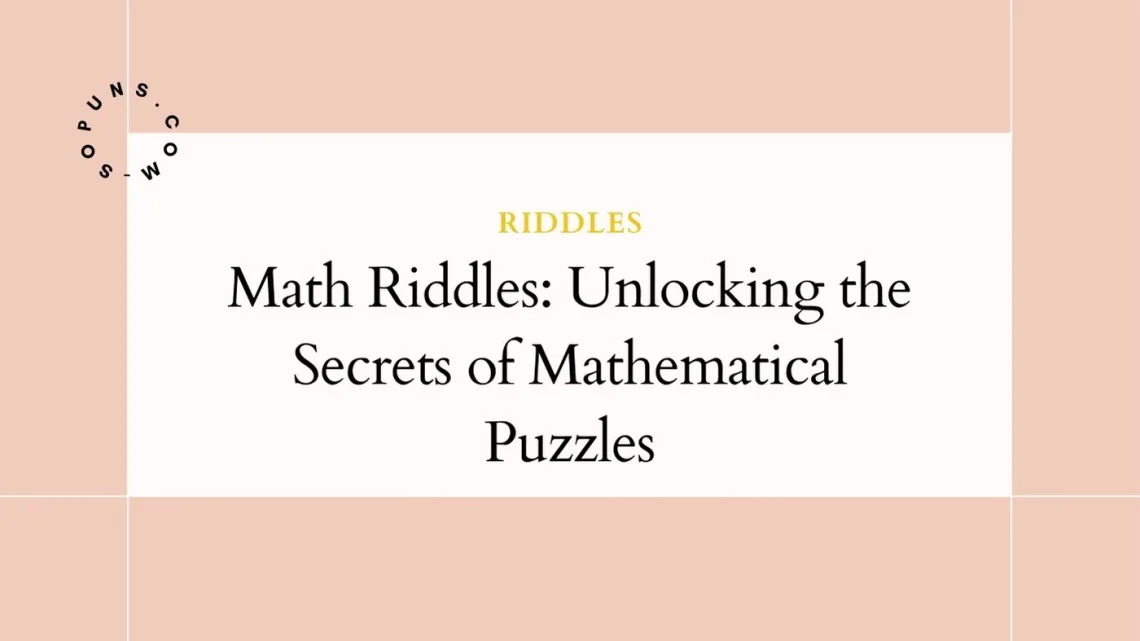
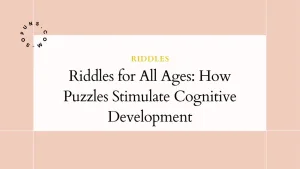
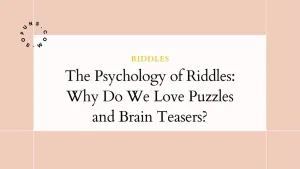
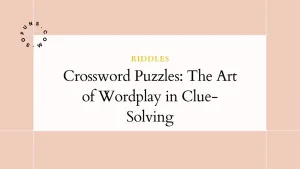
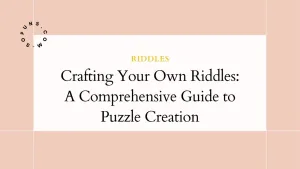
No Comments